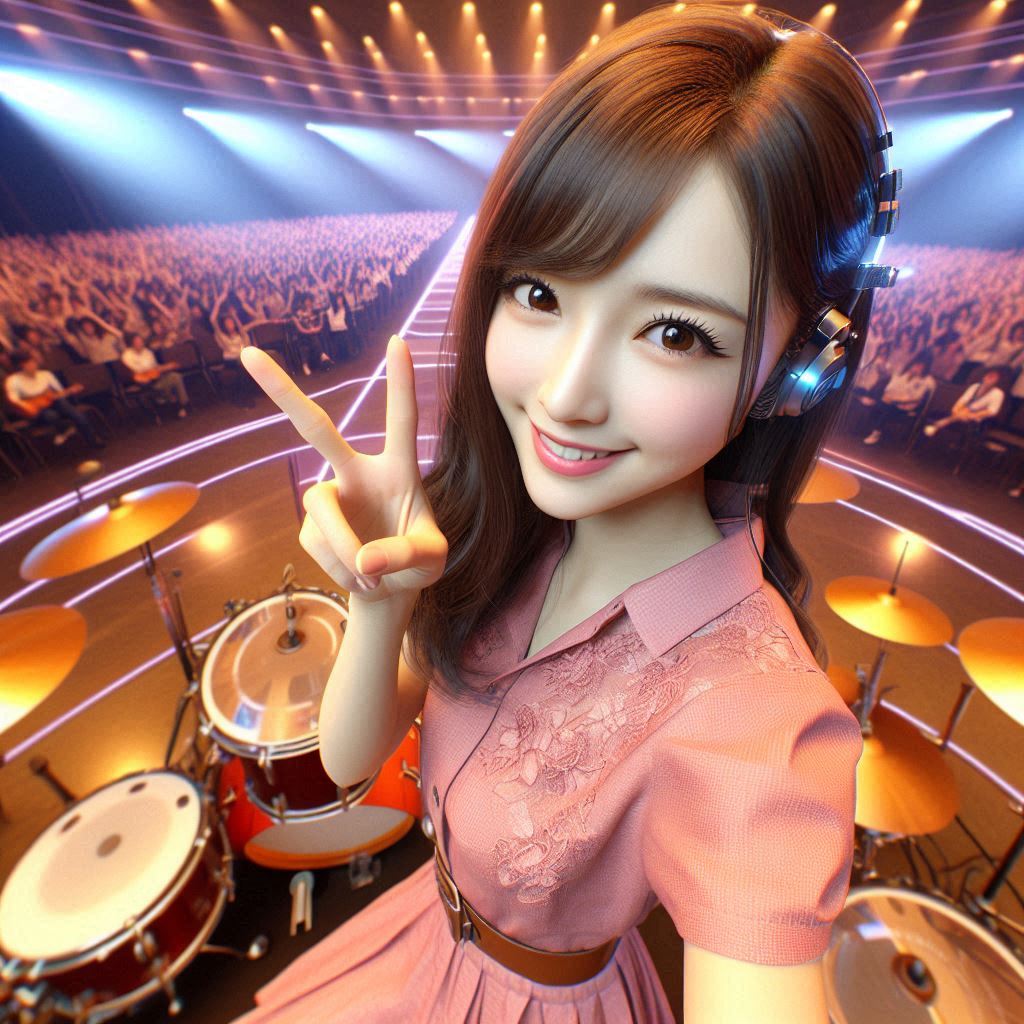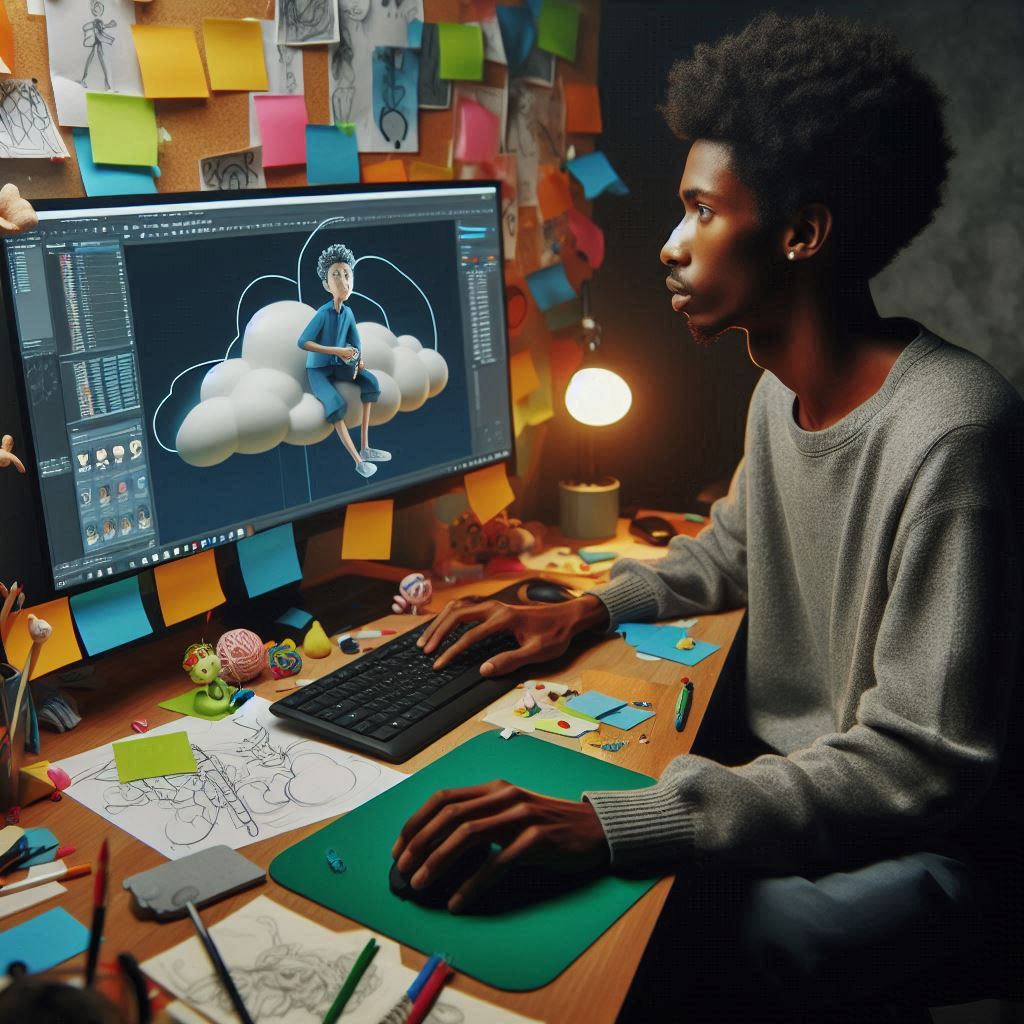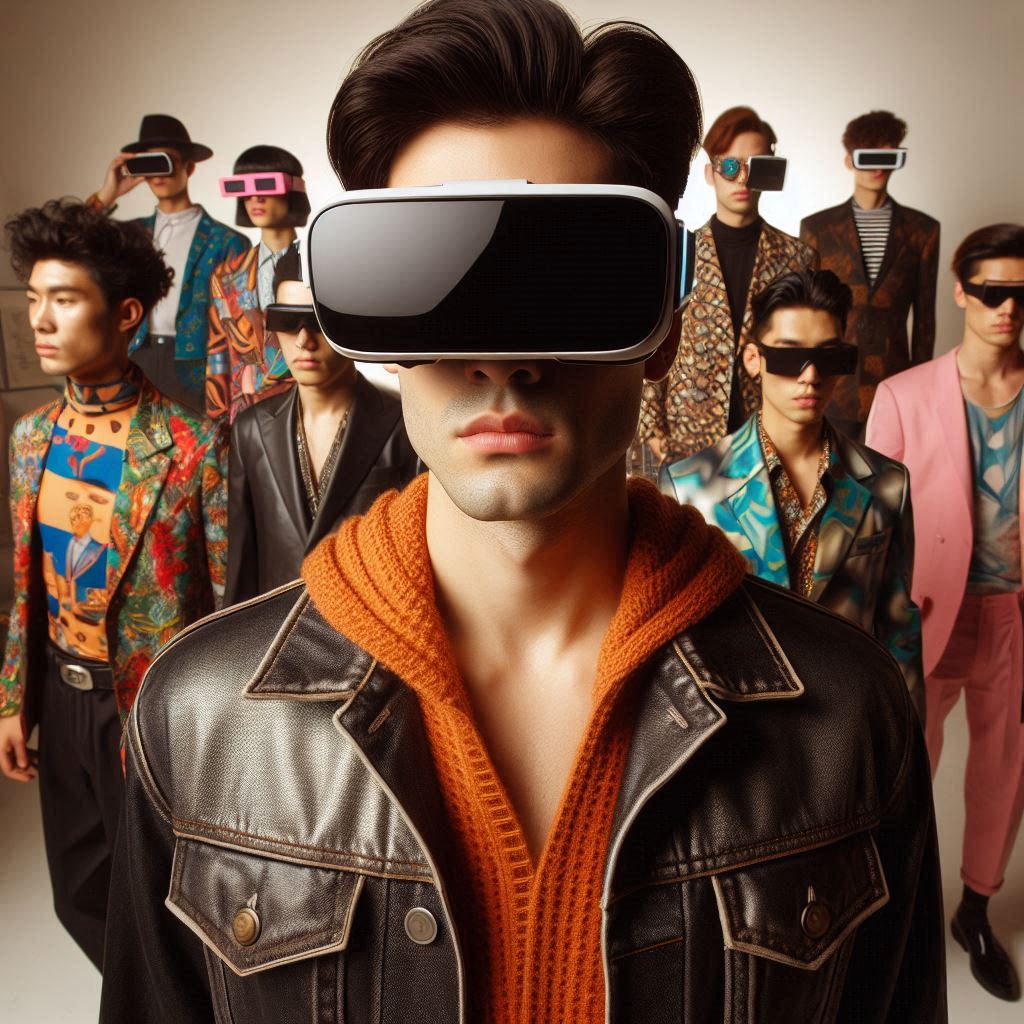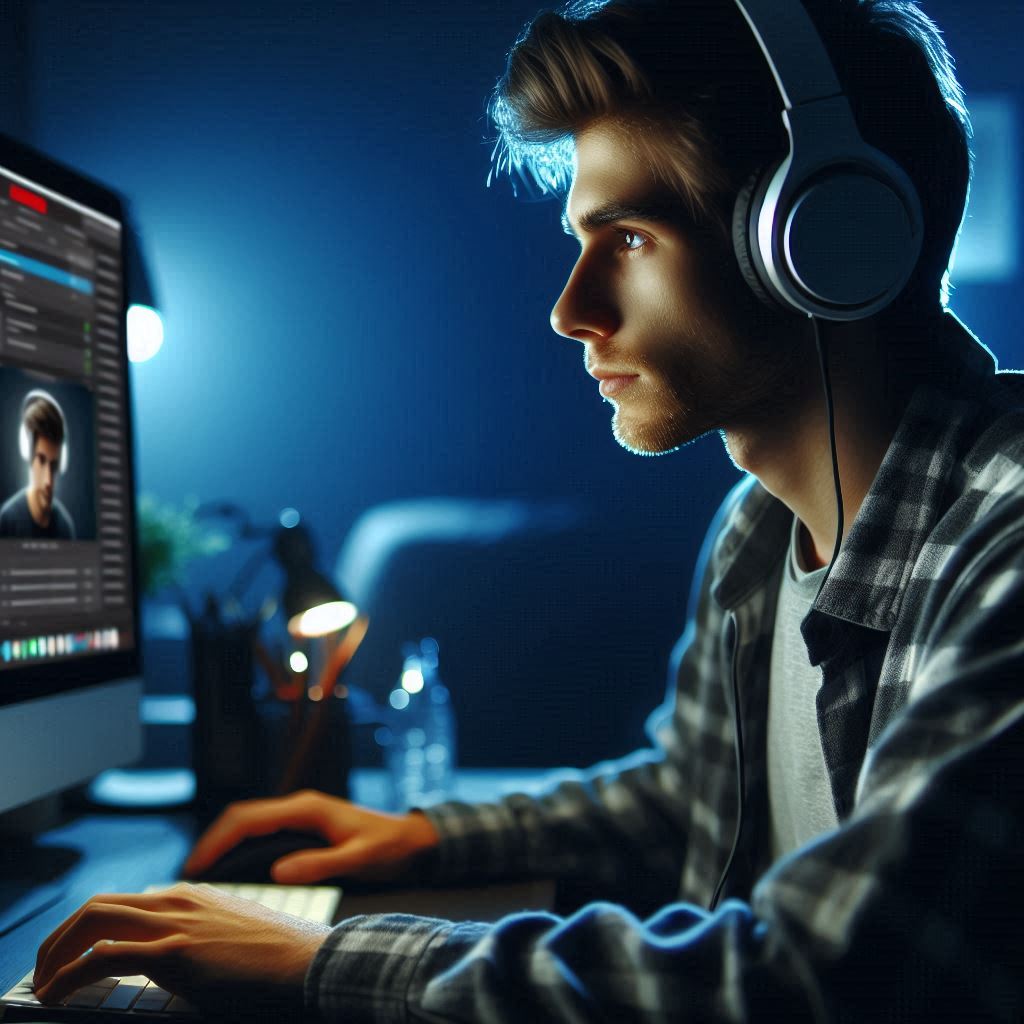Introduction
An AI-driven film has taken the industry by storm, capturing audiences and critics alike.
This technological marvel showcases the incredible potential of artificial intelligence in filmmaking.
In 2024, AI is not just a tool; it’s a revolution transforming every aspect of the film industry.
AI’s influence begins in pre-production, where it enhances scriptwriting and storyboarding.
During production, AI-driven technologies optimize filming and visual effects, bringing scenes to life with unprecedented precision.
Post-production benefits from AI through faster editing processes and superior sound design.
Distribution strategies also evolve, with AI driving targeted marketing campaigns and personalized content recommendations.
This blog post explores:
- Pre-Production: AI’s role in scriptwriting, storyboarding, and casting.
- Production: How AI optimizes filming and visual effects.
- Post-Production: The impact of AI on editing and sound design.
- Distribution: AI-driven marketing and personalized content delivery.
AI in Pre-Production
AI tools generate and enhance scripts, offering fresh perspectives and efficiency.
They assist in storyboarding, creating detailed and visually appealing sequences.
Casting directors use AI to analyze vast amounts of data, matching actors to roles with precision.
Virtual auditions, powered by AI, streamline the casting process and expand opportunities for actors globally.
AI in Production
AI-driven cameras and drones capture stunning visuals with unparalleled accuracy.
Real-time editing tools allow directors to make instant adjustments, enhancing the overall quality of the film.
Visual effects reach new heights with AI, producing realistic and immersive environments that captivate audiences.
Innovative Tech Solutions, Tailored for You
Our leading tech firm crafts custom software, web & mobile apps, designed with your unique needs in mind. Elevate your business with cutting-edge solutions no one else can offer.
Start NowAI in Post-Production
Editing becomes faster and more efficient with AI.
Automated tools handle complex tasks like color correction and video editing, freeing up human editors to focus on creative decisions.
Also, AI revolutionizes sound design, enhancing audio quality and ensuring perfect synchronization with visual elements.
AI in Distribution
AI transforms marketing strategies, using predictive analytics to target audiences effectively.
Personalized content recommendations enhance viewer experiences on streaming platforms, keeping audiences engaged and satisfied.
In fact, AI is revolutionizing the film industry in 2024, from pre-production to distribution.
This transformation promises a future where technology and creativity work hand in hand, delivering extraordinary cinematic experiences.
Pre-Production
Artificial intelligence is transforming the pre-production phase of filmmaking.
AI tools now generate and enhance scripts, making the creative process faster and more efficient.
In 2024, AI’s role in scriptwriting and storyboarding has become indispensable.
Scriptwriting and Storyboarding
AI tools assist writers in generating fresh ideas and refining storylines.
These tools analyze existing scripts and identify patterns that resonate with audiences.
Writers then use this data to create compelling narratives. AI can also help with dialogue, ensuring characters speak in consistent and authentic voices.
Successful AI-written scripts have already made their mark.
One notable example is “Sunspring,” a short film entirely scripted by AI.
The film received praise for its unique and engaging storyline.
Another example is the feature film “Zone Out,” which utilized AI to craft a complex and intriguing plot.
These successes demonstrate AI’s potential to revolutionize scriptwriting.
Storyboarding, a crucial step in pre-production, also benefits from AI.
AI-powered software generates detailed and visually appealing storyboards.
These tools create storyboards based on the script, saving time and ensuring consistency.
Filmmakers can quickly visualize scenes and make necessary adjustments.
This streamlined process allows for better planning and coordination.
Casting
Casting is another area where AI is making a significant impact.
Seamless API Connectivity for Next-Level Integration
Unlock limitless possibilities by connecting your systems with a custom API built to perform flawlessly. Stand apart with our solutions that others simply can’t offer.
Get StartedTraditional casting processes are time-consuming and subjective.
AI-driven casting decisions, however, rely on data analysis, making the process more efficient and objective.
AI analyzes vast amounts of data, including actors’ past performances, social media presence, and audience preferences.
This data helps casting directors make informed decisions.
By matching actors to roles based on specific criteria, AI ensures a better fit for each character.
This data-driven approach reduces biases and increases diversity in casting.
Virtual auditions are becoming more common, thanks to AI.
Actors can now audition from anywhere in the world, expanding the talent pool.
AI evaluates these virtual auditions, assessing factors like tone, emotion, and physical appearance.
This technology enables casting directors to consider a broader range of actors, including those who might not have been discovered through traditional methods.
AI also assists in managing the logistics of casting.
Scheduling auditions, coordinating callbacks, and maintaining actor databases become more efficient with AI.
This streamlined process saves time and resources for casting directors and production teams.
AI in Pre-Production: A Game Changer
The integration of AI in pre-production offers numerous benefits:
- Efficiency: AI tools speed up scriptwriting and storyboarding processes.
- Objectivity: AI-driven casting decisions reduce biases and increase diversity.
- Accessibility: Virtual auditions open opportunities for actors worldwide.
- Cost-Effectiveness: AI reduces time and resource consumption in pre-production.
As AI continues to evolve, its role in pre-production will only grow.
Filmmakers who embrace these technologies will gain a competitive edge.
They will be able to produce high-quality films more efficiently and effectively.
In a nutshell, AI’s impact on pre-production is profound. From scriptwriting and storyboarding to casting,
AI tools are revolutionizing the way films are made.
The benefits of AI in pre-production are clear: increased efficiency, objectivity, accessibility, and cost-effectiveness.
As the film industry continues to innovate, AI will remain at the forefront, driving creativity and excellence.
Filmmakers must adapt to these changes and leverage AI’s potential.
By doing so, they will create compelling stories and captivating visuals that resonate with audiences worldwide.
AI is not just a tool; it is a transformative force in the film industry, shaping the future of storytelling.
Transform Business with Custom CRM & ERP Solutions
Elevate your operations with a CRM or ERP tailored for you. Let’s build the perfect solution that others can't replicate—crafted to match your business's needs like no other.
Get Started
Production
AI is transforming film production, revolutionizing how movies are shot, edited, and enhanced with visual effects.
In 2024, AI has become an indispensable tool in cinematography, real-time editing, and VFX creation.
Filming
AI plays a crucial role in modern cinematography.
Automated cameras, powered by AI, capture stunning visuals with precision.
These cameras adjust settings in real time, ensuring optimal lighting and focus.
Directors can now rely on AI to handle complex shots, freeing them to concentrate on creative decisions.
Drone shots have also benefited from AI advancements.
AI-guided drones navigate challenging environments and capture breathtaking aerial footage.
These drones follow pre-programmed flight paths, maintaining stability and avoiding obstacles.
The result is smooth, professional-grade footage that enhances the visual appeal of films.
Real-time editing has become a game-changer in film production.
AI algorithms analyze footage as it is captured, making instant adjustments.
This process optimizes scenes for continuity, lighting, and color balance.
Directors receive immediate feedback, allowing them to make necessary changes on set.
This efficiency reduces the need for costly reshoots and speeds up the production timeline.
Visual Effects (VFX)
AI has revolutionized the creation of visual effects (VFX), making them more realistic and immersive.
AI-powered tools generate complex VFX with unprecedented accuracy.
These tools analyze scenes and seamlessly integrate digital elements with live-action footage.
Creating realistic VFX involves several AI-driven processes:
- Motion Capture: AI enhances motion capture technology, translating actors’ movements into lifelike digital characters.
- Image Recognition: AI identifies objects and environments in footage, aiding in the accurate placement of digital elements.
- Simulation: AI simulates natural phenomena like fire, water, and explosions, producing highly realistic effects.
Films in 2024 showcase the incredible potential of AI-driven VFX.
One notable example is “Elysian Fields”, a sci-fi epic featuring stunning digital landscapes and lifelike creatures.
The film’s VFX team used AI to create intricate details, from alien flora to massive space battles.
Another example is “Dragon’s Reign,” a fantasy adventure where AI brought mythical creatures to life.
The dragon’s movements and interactions with the environment were rendered flawlessly, captivating audiences worldwide.
Tailored Tech Solutions to Drive Your Business Forward
Maximize your business potential with custom tech strategies. We deliver bespoke solutions that others can’t match, designed to solve your specific challenges with precision and impact.
Contact UsAI also enhances the efficiency of VFX production. Traditional VFX workflows are time-consuming and labor-intensive.
AI automates many of these processes, reducing the time and effort required to produce high-quality effects.
This automation allows VFX artists to focus on creativity and innovation, pushing the boundaries of what is possible.
AI in Production: A Paradigm Shift
The integration of AI in production offers numerous advantages:
- Precision: Automated cameras and drones capture perfect shots.
- Efficiency: Real-time editing streamlines the production process.
- Realism: AI-driven VFX create lifelike and immersive digital effects.
- Innovation: AI tools enable VFX artists to explore new creative possibilities.
As AI technology continues to evolve, its role in film production will expand.
Filmmakers who embrace AI will gain a competitive edge, producing visually stunning films with greater efficiency.
In conclusion, AI’s impact on production is profound.
From filming to VFX creation, AI tools revolutionize the way movies are made.
The benefits of AI in production are clear: increased precision, efficiency, realism, and innovation.
As the film industry continues to innovate, AI will remain at the forefront, driving creativity and excellence.
Filmmakers must adapt to these changes and leverage AI’s potential.
By doing so, they will create visually captivating films that resonate with audiences worldwide.
AI is not just a tool; it is a transformative force in the film industry, shaping the future of cinematic storytelling.
Post-Production
AI is revolutionizing the post-production phase of filmmaking, significantly enhancing video editing and sound design.
In 2024, AI tools streamline the editing process, improve color correction, and create immersive soundscapes.
Editing
AI tools for video editing have become indispensable.
These tools analyze footage and suggest the best edits, saving time and effort.
Editors use AI to organize clips, identify key moments, and seamlessly blend scenes.
This automation allows editors to focus on the creative aspects of storytelling.
Color correction benefits immensely from AI advancements.
AI analyzes each frame, adjusting colors for consistency and visual appeal.
This process ensures that the final product has a cohesive and polished look.
Filmmakers can achieve professional-grade color correction without extensive manual work.
AI speeds up the editing process, reducing production timelines.
Traditional editing is labor-intensive, but AI handles repetitive tasks efficiently.
AI algorithms detect and remove unwanted elements, such as lens flares or shaky footage.
This automation enhances the overall quality of the film while saving valuable time.
AI-driven editing tools offer several advantages:
- Efficiency: Automating repetitive tasks accelerates the editing process.
- Consistency: AI ensures uniform color correction throughout the film.
- Precision: AI identifies and enhances key moments with accuracy.
- Creativity: Editors can focus on creative decisions rather than manual tasks.
Sound Design
Sound design, a critical element of filmmaking, has been transformed by AI.
AI in sound mixing allows for precise control over audio levels, ensuring a balanced soundscape.
Filmmakers use AI to enhance dialogue clarity and eliminate background noise.
This technology produces crisp and clear audio, enhancing the viewer’s experience.
AI also plays a significant role in background score creation.
AI algorithms compose music that perfectly matches the mood and tone of each scene.
These tools analyze the film’s narrative and suggest musical themes that enhance emotional impact.
Filmmakers can customize these scores, blending AI-generated music with human creativity.
Enhancing audio quality and synchronization is another area where AI excels.
AI tools identify and correct audio discrepancies, ensuring perfect synchronization with visual elements.
These tools adjust audio levels and balance sound effects, dialogue, and music.
The result is a harmonious and immersive audio experience.
The benefits of AI in sound design are substantial:
- Clarity: AI enhances dialogue and eliminates unwanted noise.
- Balance: Precise control over audio levels ensures a cohesive soundscape.
- Customization: AI-generated music can be tailored to fit the film’s narrative.
- Synchronization: AI ensures perfect alignment of audio and visual elements.
AI in Post-Production: Enhancing Quality and Efficiency
The integration of AI in post-production offers numerous benefits:
- Speed: AI accelerates video editing and sound design processes.
- Quality: AI ensures high-quality color correction and audio clarity.
- Creativity: Filmmakers can focus on creative aspects, enhancing storytelling.
- Consistency: AI maintains uniformity in visual and audio elements.
As AI technology continues to evolve, its role in post-production will expand.
Filmmakers who embrace AI will produce higher-quality films more efficiently.
In short, AI’s impact on post-production is profound.
From video editing to sound design, AI tools revolutionize the filmmaking process.
The benefits of AI in post-production are clear: increased speed, quality, creativity, and consistency.
As the film industry continues to innovate, AI will remain at the forefront, driving excellence in filmmaking.
Filmmakers must adapt to these changes and leverage AI’s potential.
By doing so, they will create films with stunning visuals and immersive soundscapes that captivate audiences worldwide.
AI is not just a tool; it is a transformative force in the film industry, shaping the future of cinematic storytelling.
Distribution
AI is transforming the distribution phase of filmmaking, revolutionizing marketing strategies and content delivery.
In 2024, AI-driven marketing campaigns, predictive analytics, and personalized streaming recommendations have become essential tools for filmmakers.
Marketing
AI-driven marketing campaigns have become the norm in the film industry.
These campaigns leverage AI to analyze vast amounts of data, identifying target audiences with precision.
AI tools examine social media activity, viewing habits, and demographic information.
This analysis allows marketers to create highly targeted and effective campaigns.
AI enhances audience targeting by segmenting audiences based on their preferences and behaviors.
Filmmakers can now tailor their marketing efforts to specific groups, increasing engagement and conversion rates.
This targeted approach ensures that promotional materials reach the right people at the right time.
Predictive analytics play a crucial role in box office success.
AI algorithms analyze past film performance, current market trends, and audience sentiment.
This analysis predicts a film’s potential success, guiding marketing strategies and budget allocations.
Filmmakers use these insights to optimize their marketing efforts, maximizing box office revenue.
Key benefits of AI-driven marketing include:
- Precision: AI identifies and targets specific audience segments.
- Efficiency: Automated data analysis saves time and resources.
- Effectiveness: Targeted campaigns increase engagement and conversions.
- Predictability: Predictive analytics guide marketing strategies and budget decisions.
Content Delivery
AI is revolutionizing content delivery on streaming platforms.
AI-driven recommendation engines analyze viewers’ preferences and behaviors.
These engines suggest personalized content, enhancing the viewer experience.
This personalization keeps audiences engaged and encourages them to explore more content.
Streaming platforms use AI to analyze viewing patterns and adjust recommendations in real time.
AI identifies trends and adapts to changes in viewer preferences.
This dynamic approach ensures that viewers always find relevant and appealing content.
Enhanced viewer experiences through AI include:
- Personalized Recommendations: AI suggests content based on individual preferences.
- Dynamic Adjustments: AI adapts recommendations in real time, reflecting current viewing trends.
- Increased Engagement: Personalized content keeps viewers engaged and satisfied.
- Exploration Encouragement: AI encourages viewers to discover new content, increasing platform loyalty.
AI also improves content delivery efficiency.
Streaming platforms use AI to manage bandwidth and optimize streaming quality.
AI predicts demand and adjusts server loads, ensuring smooth and uninterrupted viewing experiences.
This optimization enhances viewer satisfaction and reduces buffering issues.
AI-driven content delivery offers several advantages:
- Personalization: Viewers receive content tailored to their preferences.
- Optimization: AI manages streaming quality and server loads.
- Engagement: Personalized recommendations keep viewers engaged.
- Satisfaction: Improved streaming quality enhances viewer satisfaction.
AI in Distribution: A New Era
The integration of AI in distribution offers numerous benefits:
- Targeted Marketing: AI-driven campaigns reach specific audience segments.
- Predictive Success: Analytics guide marketing strategies and budget allocations.
- Personalized Viewing: AI recommendations enhance viewer experiences.
- Optimized Streaming: AI ensures smooth and uninterrupted content delivery.
As AI technology continues to evolve, its role in distribution will expand.
Filmmakers who embrace AI will gain a competitive edge, reaching audiences more effectively and delivering superior viewing experiences.
AI’s impact on distribution is profound. From marketing to content delivery, AI tools revolutionize the way films reach audiences.
The benefits of AI in distribution are clear: increased precision, efficiency, engagement, and satisfaction.
As the film industry continues to innovate, AI will remain at the forefront, driving excellence in film distribution.
Filmmakers must adapt to these changes and leverage AI’s potential.
By doing so, they will create compelling marketing campaigns and deliver personalized viewing experiences that captivate audiences worldwide.
AI is not just a tool; it is a transformative force in the film industry, shaping the future of cinematic distribution.
Read: The Impact of the Producers Guild of America on Film
Case Studies
AI is revolutionizing the film industry, and recent releases showcase its transformative power.
In 2024, several AI-driven films have made significant impacts, highlighting the benefits and potential of AI in filmmaking.
Recent AI-Driven Films
Several films released in 2024 utilized AI extensively.
These films showcase how AI can enhance creativity, efficiency, and audience engagement.
Here, we analyze a few standout examples.
1. “Elysian Fields”
- Synopsis: A sci-fi epic set in a distant future where humans colonize alien planets.
- AI Utilization: AI-powered scriptwriting tools generated intricate plotlines and character arcs. AI-driven VFX created realistic alien landscapes and creatures. Automated cameras and drones captured complex action scenes with precision.
2. “Dragon’s Reign”
- Synopsis: A fantasy adventure featuring mythical creatures and epic battles.
- AI Utilization: AI-enhanced motion capture technology brought dragons and other creatures to life. AI-driven editing tools streamlined the post-production process, ensuring seamless integration of VFX. AI-generated background scores matched the film’s tone perfectly.
3. “Zone Out”
- Synopsis: A psychological thriller exploring the depths of human consciousness.
- AI Utilization: AI analyzed audience preferences to craft a compelling narrative. AI-powered real-time editing optimized scenes for continuity and visual appeal. AI-driven marketing campaigns targeted specific audience segments, maximizing box office revenue.
Analysis of AI-Driven Films
These films demonstrate AI’s potential to revolutionize various aspects of filmmaking.
Let’s delve into the specific benefits each film experienced through AI integration.
Elysian Fields
- Scriptwriting: AI tools generated a complex and engaging storyline, saving time and enhancing creativity.
- VFX: AI-driven VFX created immersive and realistic alien worlds, captivating audiences.
- Filming: Automated cameras and drones captured stunning visuals with precision, reducing production costs.
Dragon’s Reign
- Motion Capture: AI-enhanced motion capture brought mythical creatures to life with unprecedented realism.
- Editing: AI tools streamlined the editing process, ensuring high-quality visuals and seamless VFX integration.
- Music: AI-generated scores enhanced the film’s emotional impact, perfectly matching each scene’s tone.
Zone Out
- Audience Analysis: AI analyzed viewer preferences to craft a narrative that resonated with audiences.
- Real-Time Editing: AI optimized scenes on set, reducing the need for costly reshoots.
- Marketing: AI-driven campaigns effectively targeted specific audience segments, increasing engagement and revenue.
Success Stories and Audience Reception
AI-driven films in 2024 have received widespread acclaim.
Audiences and critics alike have praised the innovative use of AI in these films.
Elysian Fields achieved massive box office success, grossing over $500 million worldwide.
Audiences praised its stunning visuals and engaging storyline, crediting AI for its groundbreaking VFX and cinematography.
Dragon’s Reign received critical acclaim for its realistic creatures and seamless VFX integration.
Reviewers highlighted AI’s role in creating a visually stunning and emotionally resonant film.
The movie earned several awards for its innovative use of AI in filmmaking.
Zone Out captivated audiences with its intriguing narrative and psychological depth.
The film’s AI-driven marketing campaign successfully reached its target audience, resulting in strong box office performance.
Critics praised the film’s seamless editing and engaging plot, showcasing AI’s potential to enhance storytelling.
AI is transforming filmmaking by enhancing scriptwriting, VFX, filming, editing, and marketing.
Filmmakers who embrace AI will produce superior films efficiently.
Read: The Art of Film Production: Lessons from PGA Veterans
Ethical Considerations
As AI revolutionizes the film industry in 2024, ethical considerations emerge.
Addressing bias in AI, job displacement, and balancing technology with human creativity become crucial topics of discussion.
Bias in AI
AI-driven casting and decision-making can introduce bias.
Algorithms may reflect societal biases present in the data they analyze.
Filmmakers must address these concerns to ensure fairness and diversity in casting.
AI systems often rely on historical data, which can include biases.
These biases can influence casting decisions, perpetuating stereotypes and limiting opportunities for underrepresented groups.
Filmmakers must develop strategies to mitigate these biases.
Several approaches can help address bias in AI:
- Diverse Data Sets: Use diverse data sets to train AI models, ensuring a broad representation of different groups.
- Regular Audits: Conduct regular audits of AI systems to identify and rectify biases.
- Human Oversight: Maintain human oversight in casting decisions to balance AI recommendations with ethical considerations.
Transparency in AI processes is also vital.
Filmmakers should disclose how AI systems make casting decisions and ensure accountability.
This transparency builds trust and promotes fair practices.
Job Displacement
AI’s increasing role in filmmaking raises concerns about job displacement.
Automation can replace tasks traditionally performed by humans, impacting various roles in the industry.
Addressing these concerns is essential for a sustainable transition.
AI automates tasks such as scriptwriting, editing, and visual effects.
While this increases efficiency, it can lead to job losses for writers, editors, and VFX artists.
Filmmakers must find ways to balance automation with job preservation.
Strategies to mitigate job displacement include:
- Reskilling Programs: Offer reskilling programs to help workers adapt to new roles in an AI-driven industry.
- Collaborative Workflows: Develop collaborative workflows where humans and AI work together, complementing each other’s strengths.
- Job Creation: Identify new job opportunities created by AI advancements, such as AI system maintenance and ethical oversight roles.
Emphasizing the value of human creativity is also important.
AI should enhance, not replace, human contributions.
Filmmakers must recognize the irreplaceable role of human imagination and intuition in storytelling.
Balancing Technology with Human Creativity
AI should serve as a tool to enhance human creativity, not overshadow it.
Balancing technology with human input ensures that films retain their artistic essence.
This balance is crucial for the industry’s future.
Filmmakers must leverage AI to handle repetitive and technical tasks, freeing up time for creative endeavors.
AI can assist with data analysis and technical precision, while humans focus on narrative and emotional impact.
Key strategies to balance technology with creativity include:
- Creative Autonomy: Ensure that filmmakers retain creative control over projects, using AI as a supportive tool.
- Collaboration: Foster collaboration between AI developers and creative professionals to align technology with artistic vision.
- Innovation: Encourage innovative uses of AI that enhance storytelling, such as AI-driven character development and interactive narratives.
Promoting a culture that values both technology and creativity is essential.
Filmmakers should celebrate the potential of AI while upholding the importance of human artistry.
This approach ensures a harmonious integration of AI into the film industry.
Addressing ethical considerations in AI’s role in filmmaking is essential.
Filmmakers must tackle bias in AI, mitigate job displacement, and balance technology with human creativity.
By doing so, they ensure that AI enhances the industry while preserving its artistic integrity.
AI can transform filmmaking, but ethical vigilance is crucial for a fair and creative future.
Read: From Script to Screen: The Art of Filmmaking

Future Prospects
AI continues to revolutionize the film industry, and future prospects promise even more transformative changes.
Upcoming AI technologies and long-term impacts will reshape filmmaking in unprecedented ways.
Innovations on the Horizon
Several emerging AI technologies hold the potential to further revolutionize the film industry.
These innovations will enhance creativity, efficiency, and audience engagement.
- AI-Driven Script Development
- AI will soon generate complex, multi-layered scripts.
- Advanced algorithms will analyze audience preferences and predict successful story elements.
- AI tools will collaborate with writers to craft compelling narratives.
- AI will soon generate complex, multi-layered scripts.
- Enhanced Visual Effects
- AI will create even more realistic and immersive VFX.
- New techniques will allow for real-time rendering of complex scenes.
- AI-driven VFX tools will reduce production time and costs.
- AI will create even more realistic and immersive VFX.
- Virtual and Augmented Reality
- AI will integrate VR and AR into filmmaking.
- Audiences will experience films in immersive, interactive environments.
- Filmmakers will explore new storytelling methods using VR and AR technologies.
- AI will integrate VR and AR into filmmaking.
- AI-Generated Music and Soundscapes
- AI will compose intricate and emotionally resonant scores.
- Sound design will become more dynamic and adaptive.
- Filmmakers will have access to a vast library of AI-generated music.
- AI will compose intricate and emotionally resonant scores.
- Interactive and Personalized Content
- AI will create personalized film experiences for viewers.
- Interactive films will allow audiences to influence the storyline.
- Customized content will increase audience engagement and satisfaction.
- AI will create personalized film experiences for viewers.
Long-Term Impact
The long-term impact of AI on the film industry will be profound.
Over the next decade, AI will reshape every aspect of filmmaking.
- Creative Collaboration
- Filmmakers will collaborate with AI tools to enhance creativity.
- AI will assist in brainstorming, script development, and visual design.
- Human creativity will combine with AI precision for innovative storytelling.
- Filmmakers will collaborate with AI tools to enhance creativity.
- Efficiency and Cost Reduction
- AI will streamline production processes, reducing costs and timelines.
- Automated tools will handle repetitive and technical tasks.
- Filmmakers will allocate more resources to creative endeavors.
- AI will streamline production processes, reducing costs and timelines.
- Expanded Accessibility
- AI will democratize filmmaking, making it accessible to a broader audience.
- Independent filmmakers will use AI tools to produce high-quality films.
- Diverse voices and stories will emerge, enriching the film landscape.
- AI will democratize filmmaking, making it accessible to a broader audience.
- New Revenue Models
- AI will enable innovative distribution and monetization strategies.
- Personalized content will attract niche audiences.
- Interactive films will generate new revenue streams.
- AI will enable innovative distribution and monetization strategies.
- Audience Engagement
- AI will transform how audiences interact with films.
- Immersive and interactive experiences will become the norm.
- Viewer feedback will shape future content, creating a dynamic relationship.
- AI will transform how audiences interact with films.
- Ethical Considerations
- Addressing bias in AI will remain a priority.
- Filmmakers will balance AI advancements with ethical practices.
- Ongoing dialogue will ensure responsible use of AI in filmmaking.
- Addressing bias in AI will remain a priority.
AI will enhance creativity and efficiency in filmmaking while making it more accessible and innovative.
Filmmakers must balance advancements with ethical practices to captivate audiences.
Read: Apps for Music Lovers: Top 10 Must-Haves in 2024
Conclusion
Summary of Key Points
AI is revolutionizing the film industry in 2024. In pre-production, AI enhances scriptwriting, storyboarding, and casting.
Filmmakers use AI to generate scripts, create detailed storyboards, and make data-driven casting decisions.
AI-driven cameras and drones capture stunning visuals in production, while AI optimizes real-time editing and VFX creation.
Post-production benefits from AI tools that streamline video editing, color correction, and sound design.
AI ensures high-quality results and faster workflows.
In distribution, AI-driven marketing campaigns target specific audiences effectively.
Predictive analytics guide marketing strategies, maximizing box office success.
AI-powered streaming platforms offer personalized content recommendations, enhancing viewer experiences.
These advancements demonstrate AI’s transformative impact on every filmmaking stage.
Final Thoughts
Embracing AI in filmmaking offers numerous benefits.
However, preserving the human touch remains crucial.
AI should enhance creativity, not replace it.
Filmmakers must balance technological advancements with artistic integrity.
By doing so, they ensure that films retain their emotional and narrative depth.
Human imagination and intuition remain irreplaceable in storytelling.
Call to Action
Explore the exciting world of AI-driven filmmaking.
Watch a recent AI-driven film to experience its impact firsthand.
Discover AI tools that can enhance your creative process.
Embrace the future of filmmaking by integrating AI into your projects.
By combining technology with creativity, you can produce compelling and innovative films.
AI is not just a tool; it is a transformative force.
Use it to push the boundaries of storytelling and captivate audiences worldwide.
Additional Resources
For Further Reading:
- AI Screenwriting: How AI is Transforming the Art of Storytelling
- Artificial Intelligence and Filmmaking: Threats and Features
- AI and Film Making: How AI is Shaping the Future of Cinema
Before You Go…
Hey, thank you for reading this blog post to the end. I hope it was helpful. Let me tell you a little bit about Nicholas Idoko Technologies.
We help businesses and companies build an online presence by developing web, mobile, desktop, and blockchain applications.
We also help aspiring software developers and programmers learn the skills they need to have a successful career.
Take your first step to becoming a programming expert by joining our Learn To Code academy today!
Be sure to contact us if you need more information or have any questions! We are readily available.











